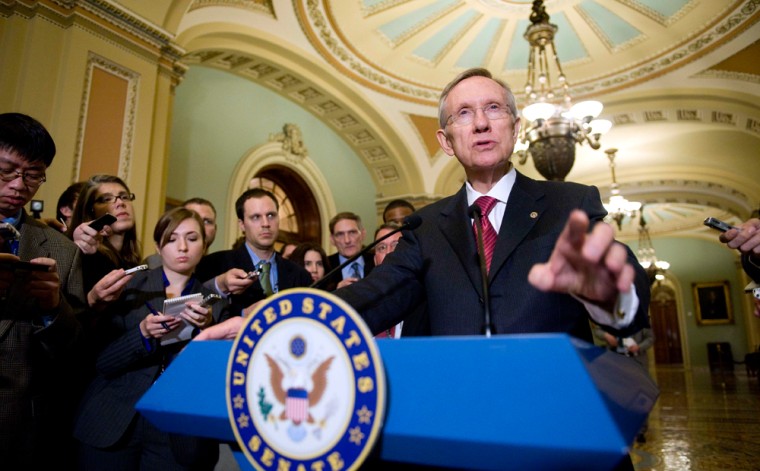Congressional Democrats said on Thursday they would vote to extend Bush-era tax cuts for the lower and middle classes only, setting up a clash with Republicans only two weeks after midterm elections.
The moves end days of hand-wringing by Democrats to find a common strategy before a December 31 deadline for expiration of tax cuts for nearly all Americans and a Republican takeover of the House of Representatives next year.
A clash over taxes augurs badly for any chance that the two parties will work together after this month's elections on major issues like cutting the budget deficit and creating jobs.
Senate Democratic leader Harry Reid said he believes he has President Barack Obama's support in pursuing tax cuts for everyone except the wealthy, after some concern that Obama had been ready to deal with Republicans over cuts for the rich.
"The main thing we've learned is that we're united in recognizing that we have to protect the middle class," Reid told reporters.
Democrats will need to win the support of at least one Republican to reach the 60 vote threshold needed to advance legislation in the 100-seat Senate. That appears unlikely at this point, Democrats have said.
Obama had signaled a willingness to compromise following Democrats' defeat in the November elections, suggesting a permanent extension for the lower- and middle-class income groups and possibly a shorter-term extension for wealthier Americans.
But Republicans rejected this approach. They have been united in insisting that Congress renew all tax cuts and have vowed to block efforts to handle cuts for different income groups separately.
The House also will vote on extending lower tax rates for those in the lower and middle classes only, said a leadership aide.
"The president and leaders were in agreement that this is an issue that has to be dealt with," Robert Gibbs, the White House spokesman, told reporters after Obama met with Democratic leaders at the White House.
The tax cuts, enacted under former Republican President George W. Bush, will expire at the end of this year if Congress does not act.
Both Democrats and Republicans want to extend the lower tax rates on the first $200,000 of an individual's income. But they are divided over what to do with the top rates paid by the wealthiest 2 percent of Americans.
Republicans want additional low rates to continue for those in the upper income brackets.
The presumed next Speaker of the House, Republican Majority Leader John Boehner reinforced his position, telling reporters: "I believe that we ought to extend all of the current tax rates for all Americans."
Many believe the most likely outcome is a one-to-three year extension of all current rates of the Bush tax cuts, given Republicans' unity and Democrats' failure to come together for a vote before the November elections.
Such a deal would play into Republican hopes of ousting Obama in 2012 and then making all of the cuts permanent. It would also avoid defending the rates for the higher income groups alone because all the rates would expire in unison.
Extending just the lower rates for the lower and middle class will cost about $2.9 trillion over 10 years; also renewing the rates for those in the upper income group costs about $700 billion over a decade, according to the Treasury Department.
